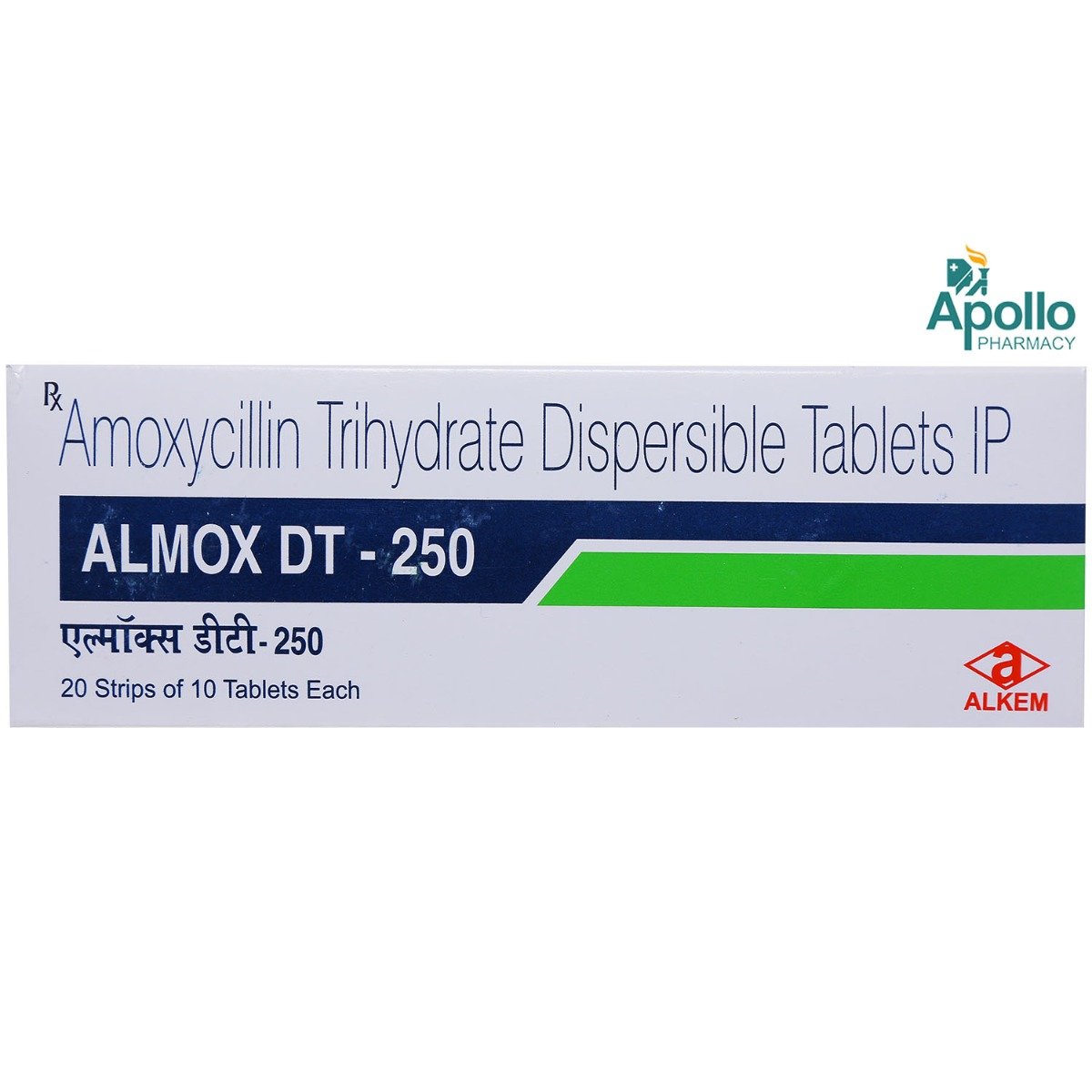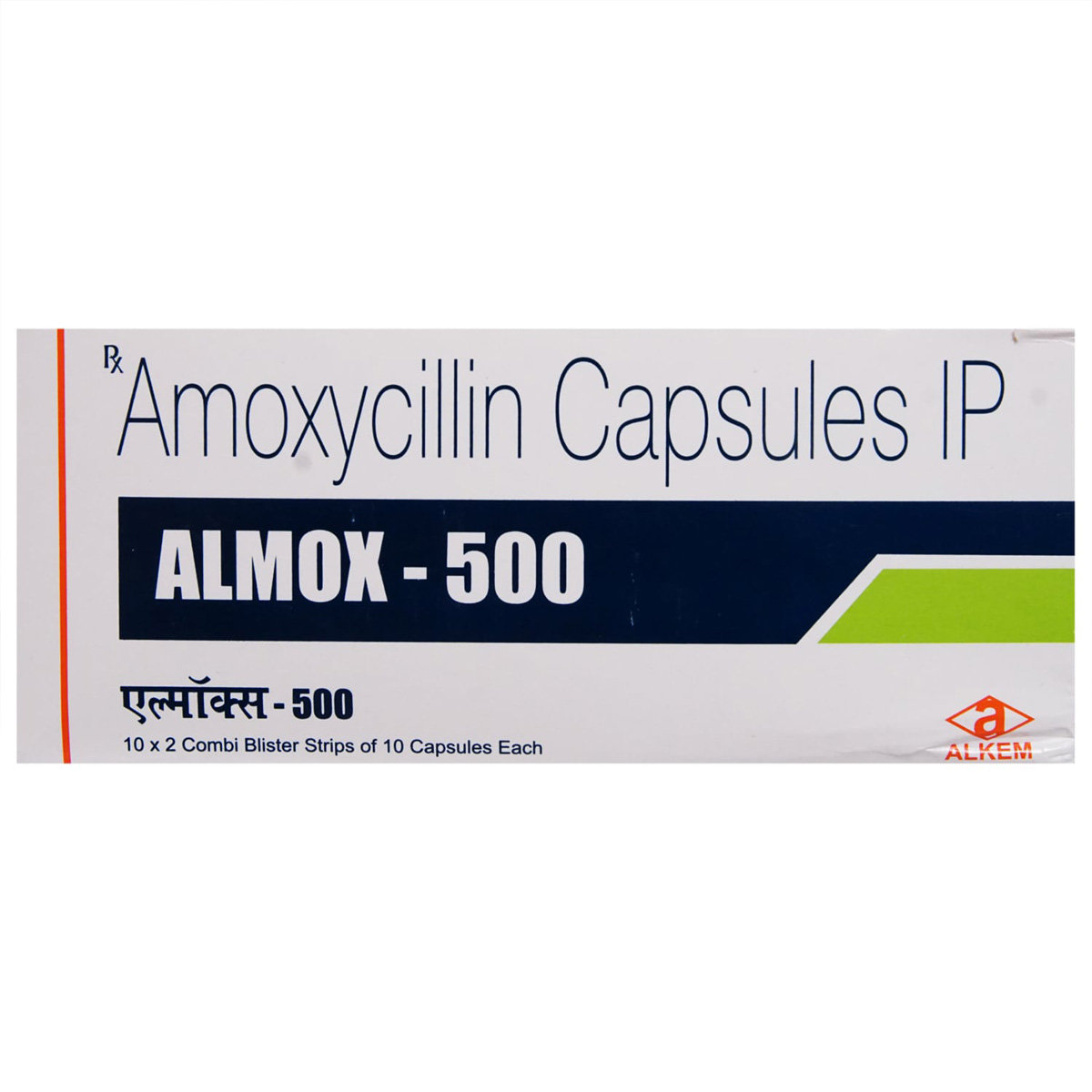Amoxycillin
About Amoxycillin
Amoxycillin is an antibiotic used to treat various bacterial infections such as pneumonia, bronchitis, tonsillitis, pharyngitis and sinusitis, acne, ear infections, and sexually transmitted infections. A bacterial infection is a condition in which bacteria grow in the body and cause infection.
Amoxycillin contains Amoxycillin, which kills the bacterial cell by blocking the chemical (mucopeptides) released by the bacteria's outer layer (cell wall).
Not everyone who is taking Amoxycillin will get these side effects. Some common side effects of Amoxycillin are diarrhoea, nausea, vomiting, and indigestion. These side effects are temporary and may resolve on their own over time. However, if these side effects persist, don't hesitate to contact your doctor.
Amoxycillin should only be taken if advised by your doctor. It can be taken with or without food but should be consumed at a fixed time for the best results. The Amoxycillin should not be consumed in a dose exceeding the recommended amount to avoid unpleasant side effects. Also, the course should be completed even if you feel better.
Inform your physician if you are allergic to Amoxycillin, or have any history of liver problems or muscle problems. Do not use Amoxycillin without a doctor's advice if you have a skin reaction or irritation to any medicine. Do not discontinue or abruptly stop the medication, as it may lead to antibiotic resistance, a condition in which bacteria become resistant to antibiotics.
Uses of Amoxycillin
• Bacterial Infections: Amoxycillin is widely used to treat various bacterial infections, including pneumonia, bronchitis, and ear infections.
• Skin Infections: Amoxycillin effectively treats skin infections caused by susceptible bacteria, reducing inflammation and promoting healing.
• Urinary Tract Infections (UTIs): Amoxycillin is prescribed to manage UTIs by targeting the bacteria responsible for the condition.
• Stomach Ulcers: Amoxycillin can be part of a comprehensive treatment plan to eliminate Helicobacter pylori, a bacterium associated with stomach ulcers.
• Dental Infections: Dentists commonly recommend Amoxycillin to treat dental infections and prevent complications during or after dental procedures.
Medicinal Benefits
- Amoxycillin is a broad-spectrum antibiotic that helps treat various bacterial infections.
- Amoxycillin is effective against gram-positive (S. pneumoniae) and gram-negative bacteria (E. coli, Haemophilus influenzae, Neisseria gonorrhoea).
- Besides this, Amoxycillin also helps treat stomach ulcers caused by the H. pylori bacteria.
- If combined with antibiotics like clarithromycin and acidity medicine like lansoprazole, it helps reduce the symptoms of duodenal ulcers.
- Amoxycillin can be safely prescribed and well-tolerated among adults, children, and pregnant and nursing mothers.
- Amoxycillin weakens and destroys the bacterial cell wall. It is a broad range of antibiotics that help fight various types of bacteria.
Directions for Use
- Amoxycillin can be taken with or without food or as advised by your doctor.
- Follow your doctor's instructions on the dosage and timing of this medication.
- Swallow Amoxycillin as a whole with a glass of water.
- Do not crush, break, or chew it.
Storage
Side Effects of Amoxycillin
- Feeling sick (nausea)
- Loss of appetite
- Bloating
- Indigestion
- Vomiting
Drug Warnings
- Do not take Amoxycillin if you are allergic to any of its components.
- Taking Amoxycillin may cause antibiotic-induced diarrhoea in some cases.
- Penicillin antibiotics, blood thinners (warfarin, coumadin), uric acid-lowering drugs (allopurinol, probenecid), and anti-cancer or anti-arthritis drugs (methotrexate) may severely interact with Amoxycillin.
- Tell your doctor if you have chronic kidney disease or viral glandular fever (mononucleosis) before taking Amoxycillin.
- This medicine may lower the efficiency of oral birth control pills or contraceptive devices.
- An intake of Amoxycillin may alter some glucose urine tests like the copper reduction test report.
- Do not use Amoxycillin in more than prescribed doses or longer duration as it may cause adverse effects.
- Keep your doctor informed about your health condition and all the medicines you take before taking Amoxycillin to rule out any side effects.
- It is always important to check the expiry date of the medicine. Discard the medicine if it reaches the expiry date.
Drug Interactions
Drug-Drug Interactions: Amoxycillin interact with penicillin antibiotics, blood thinners (warfarin, coumadin), uric acid-lowering drugs (allopurinol, probenecid), and anti-cancer or anti-arthritis drug (methotrexate).
Drug-Food Interactions: Grapefruit juice and dietary supplements containing minerals like calcium may also work to dampen the effect of antibiotics.
Drug-Disease Interactions: Amoxycillin should not be given in the condition of colitis, glandular fever, and chronic kidney disease. Colitis is characterized by severe diarrhoea and abdominal cramps associated with the passage of mucous and blood via stool or vomiting.
Drug-Drug Interactions Checker List:
Safety Advice

Alcohol
unsafeDo not drink too much while taking this medicine. Drinking a lot of alcohol may more likely to drowsiness, dizziness or sleepiness side effects.

Pregnancy
cautionAmoxycillin is a pregnancy category B drug. So, Amoxycillin can be safely taken by pregnant women if prescribed by the doctor.

Breast Feeding
safe if prescribedCan safely give Amoxycillin to breastfeeding mothers.

Driving
cautionYou may have side effects like dizziness after taking Amoxycillin that may make you unfit to drive. So, it is advisable not to drive or operate machinery until you are feeling well.

Liver
safe if prescribedAmoxycillin can be safely taken in case of liver disease if prescribed by the doctor. Your doctor will weigh the benefits and any potential risks before prescribing Amoxycillin.

Kidney
cautionTake Amoxycillin with caution if you have severe kidney disease. Your doctor may reduce the dose of Amoxycillin in patients with severe renal impairment (GFR less than 30 mL/min).

Children
consult your doctorAmoxycillin can be safely given to to children, only if recommended by a child specialist only.
Habit Forming
Diet & Lifestyle Advise
- After taking the full course of Amoxycillin, probiotics should be taken to restore some of the healthy bacteria in the intestine that may have been killed. Taking probiotics after antibiotic treatment can reduce the risk of antibiotic-associated diarrhoea. Certain fermented foods like yoghurt, cheese, sauerkraut and kimchi can restore the intestine's good bacteria stink.
- Include more fibre-enriched food in your diet, as it can be easily digested by gut bacteria, which helps stimulate their growth. Thus fibre foods may help restore healthy gut bacteria after taking a course of antibiotics. Whole grains like whole-grain bread, and brown rice, should be included in your diet.
- Avoid taking too many calcium-enriched foods and drinks as it might affect the working of Amoxycillin.
- Avoid intake of alcoholic beverages with Amoxycillin as it can make you dehydrated and affect your sleep. This can make it harder for your body to aid the Amoxycillin in fighting off infections.
Patients Concern
Disease/Condition Glossary
Bacterial infections: A bacterial infection is a condition in which harmful bacteria enter, multiply, and infect our body. It can target any body part and multiple very quickly. When you get infected with bacteria, you can experience generalized symptoms like fevers, chills, and fatigue. Bacteria are of various forms comprising commonly spherical, rod, and spiral-shaped. Bacterial infections vary from minor illnesses like sore throat and ear infections to severe brain infections like meningitis and encephalitis. Few harmful bacteria that cause infections include Streptococcus, Staphylococcus, and E. coli. Anyone can become infected with a bacterial infection. But, people with weak immune systems or taking immunosuppressive medicine can make you more prone to bacterial infection.
FAQs
Amoxycillin is used to treat various bacterial infections like ear, nose, or throat (ENT) infections, skin infections, genitourinary tract, and lower respiratory tract infections (LRTI) caused by susceptible bacteria.
Amoxycillin kills the bacterial cell by blocking the chemical (mucopeptides) released by the bacteria's outer layer (cell wall). In turn, Amoxycillin weakens and destroys the bacterial cell wall. It is a broad range of antibiotics that helps in fighting various types of bacteria.
Amoxycillin belongs to the class of penicillin antibiotics. Amoxycillin is a broad-spectrum antibiotic effective against a wide range of bacteria. On the other hand, penicillin is a narrow-spectrum antibiotic effective against fewer bacteria.
Do not use anti diarrhoeal until the doctor has prescribed you. You can drink plenty of fluids (electrolytes) to avoid dehydration. Besides this, you can also take prebiotics or probiotics to manage diarrhoea as it may help increase the number of good bacteria in the intestine, which aids indigestion.
Try to stay well hydrated by drinking at least six glasses of water or other fluid per day. Always keep your bladder empty as much as possible by peeing regularly.
After taking an antibiotic, you may need to wait for up to three hours to eat or drink any dairy products, including milk and butter, yoghurt, and cheese. Grapefruit juice and dietary supplements containing minerals like calcium may also work to dampen the effect of antibiotics.
Do not stop using Amoxycillin even if you feel better. It should be strictly used as advised by your doctor to avoid the recurrence of symptoms and to worsen the disease.
Amoxycillin may cause side effects such as nausea and diarrhoea. If these side effects persist or worsen, please consult your doctor.
Amoxycillin can be used during pregnancy if prescribed by a doctor. Do not self-medicate, especially during pregnancy since there is limited safety information available on the use of Amoxycillin during pregnancy. Consult a doctor before taking Amoxycillin.
You should not take Amoxycillin if you have or ever had cirrhosis, severe kidney or liver disease, adrenal gland failure, an electrolyte imbalance, or an allergy to Amoxycillin or sulfa drugs. Also, inform your doctor if you are pregnant, planning to conceive or are breastfeeding to avoid any harmful effect on your baby.
Amoxycillin is effective if used in the dose and duration prescribed by your doctor. Do not stop taking Amoxycillin even if you see improvement in your condition as discontinuing Amoxycillin too early may cause symptoms to worsen or reoccur.
If you forget to take a dose of Amoxycillin, take it as soon as you remember. However, if it is almost time for your next dose, skip the missed dose and take the next scheduled dose in the prescribed time. Do not double the dose to make up for the missed one as this may increase the risk of side effects.






